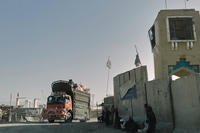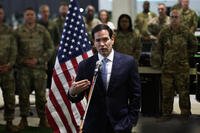British Prime Minister David Cameron reportedly has dropped plans for a parliamentary vote on expanding airstrikes against the Islamic State into Syria, in the latest blow to President Obama's attempts to form a stronger coalition against the Islamic terror group.
Though the U.K. has joined the U.S. in conducting airstrikes against ISIS in Iraq since 2014, multiple U.K. media outlets including The Guardian and The Times of London reported Cameron was hoping to put a vote forward in the House of Commons on joining the U.S. as the Obama administration seeks to regain its foothold amid a surging Russian presence. Those outlets report Cameron has since shelved the move.
A Foreign Affairs Committee report issued Tuesday also urged Cameron not to join the airstrikes unless there was a "coherent international strategy" that can realistically defeat ISIS.
"In the absence of such a strategy, taking action to meet the desire to do something is still incoherent," the report said.
Additionally, Cameron has found himself under pressure from the new hard-left leader of the U.K.'s Labour Party, Jeremy Corbyn.
Corbyn, the former chairman of the "Stop the War Coalition," has brought a strong isolationist voice to the main party of opposition, which some analysts believe has been the key factor in Cameron's decision to shelve the vote as it has discouraged Labour MPs who would normally back military intervention from doing so.
"I think Corbyn is the single biggest factor driving the prime minister's decision," Nile Gardiner, director of the Heritage Foundation's Margaret Thatcher Center for Freedom, told FoxNews.com. "Corbyn has taken the Labour Party down an extreme far-left route and the Labour Party now is increasingly against almost any kind of overseas British military intervention."
An official with Number 10 Downing Street, though, told FoxNews.com that Cameron's position "hasn't changed" and that the government is still trying to build consensus.
"He has consistently said we'd only go back to the issue if there was clear consensus and that remains the case," the official said. "Meanwhile the government continues to work to bring the conflict to an end in Syria and we are working closely with our allies to inject greater momentum into efforts to find a political situation which we've always said will be the way to bring this war to an end and give Syria hope for the future."
Gardiner called the latest developments in London "very bad news" for the White House.
"This is without a doubt a huge blow to the U.S.-led international coalition in Iraq and Syria," Gardiner said. "Although Britain will continue to play a role in terms of airstrikes in Iraq, Syria is really emerging as the main battleground and so the British move significantly undermines the U.S. position and makes it far harder to build a powerful U.S.-led coalition for military action inside Syria."
The lack of commitment from U.K. leadership is the latest hit to Obama's efforts, just days after he authorized sending dozens of Special Operations Forces to Syria to help advise local ground troops and coalition efforts as part of a broader strategy to revitalize the struggling campaign against ISIS.
Canada, another key U.S. ally, has also wavered on committing military might to the war-torn nation. Liberal Prime Minister Justin Trudeau, who was sworn into office Wednesday after his election victory in October, has committed to withdrawing fighter jets from the anti-ISIS fight in both Iraq and Syria.
In response, White House Press Secretary Josh Earnest praised Canada's "important contribution" to the anti-ISIS effort and expressed hope that "we can continue to count on their ongoing support for this very important mission."
Obama also faced scrutiny over his Syria strategy at home Wednesday, as a House Foreign Affairs Committee grilled two top U.S. diplomats about concerns the administration's policy was too limited amid growing Russian intervention.
During the hearing, Ambassador Anne Patterson, assistant secretary of state for Near Eastern affairs, told lawmakers that the Russians had exacerbated the situation and that 80-90 percent of Russian airstrikes were hitting moderate rebels and not ISIS targets.
Rep. Ed Royce, R-California, chairman of the committee, blasted U.S. policy as "tepid."
"A diplomatic solution is only possible with a strong, coherent, moderate opposition that can serve as a bridge from Assad to a new post-conflict government. Yet the administration has done little to help the opposition. Its feeble train-and-equip program is now defunct," Royce said, adding that "no-one believes" the special forces would be decisive.





























